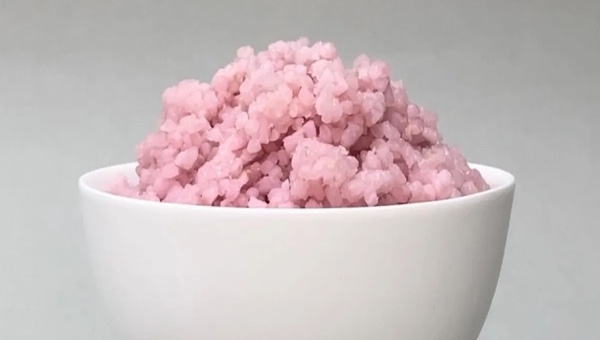
KOREAN SCIENTISTS ARE GROWING ANIMAL CELLS IN RICE GRAINS
CULTURED BEEF RICE: 'HYBRID' FOOD ENGINEERED FOR WARFARE, SPACE TRAVEL
BY: SEJAL SHARMAORIGINAL SITE: INTERESTING ENGINEERING
In eatables that could be used during wars or in space, where there’s usually a scarcity of edible food, a new kind of ‘hybrid’ meals can come to the rescue.
Scientists from Korea have created a new recipe wherein they have grown animal muscle (beef) inside grains of rice and they are calling it cultured beef rice.
The researchers plan to commercialize this method and they believe it could offer a more affordable protein alternative with a smaller carbon footprint.
“Imagine obtaining all the nutrients we need from cell-cultured protein rice,” said Sohyeon Park, the first author of the study. “Rice already has a high nutrient level,
Related
'A shortcut to a sustainable food system'
As people become more interested in sustainable development, they're paying more attention to how we produce food for the future. We're always trying to make sure we have enough food to eat, even when things get tough
There are a lot of changes happening in the way we grow and make our food because of things like health concerns, diseases, climate change, and not having enough resources.
Other sustainable foods that fall in a similar category include lab-grown meats , algae, insects, genetically modified foods, and even foods made with 3D printers.
But there are some problems with these new foods, like not tasting good or being too expensive. For example, cell-cultured meat is grown from cells in a lab using a base made from plants like soy or nuts.
Scientists are using parts of eggs or certain types of gels to help grow these hybrid meats. However, some of these ingredients might cause allergies, and they might not be able to support enough cell growth without adding extra stuff to make the meat taste better.
One idea that seems promising is making "hybrid" foods by mixing plant and animal ingredients. Rice grains are packed with good stuff like carbohydrates, fats, proteins, and minerals that are important for our bodies.
Low incidence of allergy
They also have special substances that help our cells grow well and stay healthy. Unlike some other ingredients, rice isn't likely to cause allergies. Plus, its structure makes it a great place for cells to grow, researchers noted in their study.
Researchers first coated the rice with a special mixture made from fish gelatin and enzymes that help cells stick to them and grow properly.
After about nine to 11 days, they harvested the final product: beef rice made from cultured cells. This beef rice meets safety standards and has a low risk of causing food allergies.
“We usually obtain the protein we need from livestock, but livestock production consumes a lot of resources and water and releases a lot of greenhouse gas,” said Park.
The team noted that the hybrid rice had more protein and fat than regular rice and had a firmer texture. Depending on the muscle or fat content, it smelled like beef, almond, cream, butter, or coconut oil.
“I didn’t expect the cells to grow so well in the rice,” added Park. “Now I see a world of possibilities for this grain-based hybrid food. It could one day serve as food relief for famine, military ration, or even space food.”
The study was published in the journal Matter .
Study abstract:
A strategy to develop a nutrient-rich hybrid food using rice grains functionalized with nanocoating and bovine cells for a sustainable food system is reported. Rice grains are safe food ingredients with a low incidence of allergy and have a nutritional profile and structure suited for 3D cell culture. An edible coating composed of fish gelatin and food enzymes offers a high affinity between rice grains and cells and improves the structural stability of grains for increased cell capacity. The potential of rice grains as cell scaffolds is demonstrated by investigating the interactions between the coating, grains, and cells. The rice grains are transformed into a hybrid food with animal nutrients by containing organized bovine cells. We discuss the food properties and production value of this rice-based meat to evaluate its potential as a sustainable food that guarantees safety from food crises and global warming.
AWFSM CATEGORIES
Activism | AI | Belief | Big Pharma | Conspiracy | Cult | Culture | Deep State | Economy | Education | Entertainment | Environment | Faith | Global | Government | Health | Hi Tech | Leadership | Politics | Prophecy | Science | Security | Social Climate | Universe | War
